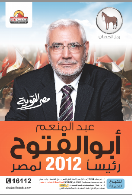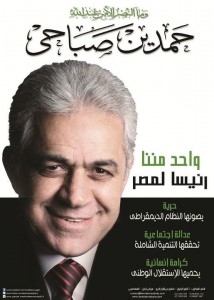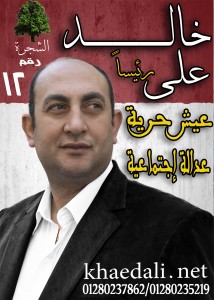This post is part of our special coverage of Egypt Elections 2011/12.
About ten days remain before the presidential elections in Egypt. A few days ago we witnessed the first presidential debate in the country's history, but the candidates’ posters also play a big role in the final decision of the voters.
In an earlier post we saw how Abou Ismail – he's out of the race now – tried to influence people by the sheer number of his posters, but shouldn't the posters’ design, colours and slogans play a role too?
Bloggers Mariam Saleh (@Mariam_Slh) and Mohamed Hussein have tried to analyse the posters of the different candidates.
Abdel-Monem Aboul-Fotoh
Mariam Saleh wrote an analysis of Abdel-Monem Aboul-Fotoh'sposter, its colours, font, and so on:
Having the sky and the shining sun in the poster, makes you think that the sky is his limit. Choosing a scene from the revolution to say that he is a revolutionary candidate was not really needed, it's his actions, slogan and program that should say that. Plus, not every person who took part in the revolution will always be a revolutionary. He needs proof other than photos that he is still a revolutionary, that is if he is. The font is a nice and friendly one. Also the fact that his logo has the pyramids gives a feeling of belonging to Egypt as a country and not just to the Islamic Ummah. This is comforts those who want to think that he is different from the rest of the Islamists who don't care about Egypt as much as the Islamic Ummah [nation].
She added:
His father-like look gives a feeling of fondness and comfort. His tiny smile makes me feel his serious but kind to us. Again the fact that he is sitting down and not standing tall is sort of comfortable.
Mohamed Hussein also wrote about the candidates’ posters [ar], and this is what he had to say about Aboul-Fotoh's:
الصورة الشخصية: بدون زوايا، فقط أبو الفتوح في مواجهتك بابتسامة هادئة، وهو ما يمنحه حميمية، والمصمم استخدم درجة ألوان تلائم شعره الأبيض وترك التجاعيد لحالها.
His photo: no angles, just a front view of Aboul-Fotouh with a calm smile that gives you a sense of intimacy. The designer used colours that suit his white hair and left the wrinkles untouched.
Mariam commented on Aboul-Fotoh's slogan, “The Powerful Egypt”:
A nice slogan that gives a shot of hope. His explanation of a powerful Egypt is one that is economically, politically, scientifically and militarily powerful. One that will give power and dignity to every Egyptian. The fact that his program makes it sound like an impossible dream is not the slogan's problem. The one problem with the slogan is actually a problem within us; the minute I read it I remember the old regime that only showed its power on its people. Of course he means a strong country and definitely not a government that kills its own people.
Hamdeen Sabahy
As for Hamdeen Sabahy, Mariam wrote:
The fact that the part below is black and the part above is white gives a feeling that he'll take us from the dark ages to a better one. The font used for his name and the Qur'anic verse is also a very nice one that says so much about him being connected to the Arab and Islamic world and heritage. The other font that is used for the rest of the sentences is also a friendly and comforting one, and the three sentences summarize his program very well. Focusing on his smiling face rather than his body and his suit again gives the same kind of comfort.
Mariam then added that Hamdeen is a moderate leftist who believes in a secular government, so the use of a Qur'anic verse in his poster can be interpreted in different ways. She moved to the candidate's slogan, “One of us”:
Although it makes us feel that he's closer to us than any other candidate, it doesn't say much. It does mean that he'd feel our pains because he's one of us though, which of course gives his campaign some sort intimacy. Yet, I keep thinking how a taxi driver is one of us, but would probably not make a good president.
Khaled Ali
Mariam commented on one of Khaled Ali'sposters:
Very simple with the flag colors. He has a look of a dreamer, this is a problem. I'd rather he looks straight to us, not down and not up. We want a realistic person, yes someone who can make dreams come true, but not a dreamer who looks to the sky and forgets to look ahead
Mohamed Hussein criticised another of Khaled Ali's posters, where he again doesn't look straight to the camera, and added:
Mariam noted that Khaled Ali's slogans are taken from people's chants during the revolution:
Bread, freedom, social justice and We'll make their dream a reality: Khaled Ali's campaign is very poor unfortunately, so the advertising is not very professional. So I found two slogans both are revolution's chants… Sort of lack of creativity, but this is their way of proving that he's one of the revolutionary candidates. Both are nice and revolutionary and since these chants are the revolution's demands they make sense. But they could've done better with creating a new revolutionary slogan.
There are officially 13 candidates in the Egyptian presidential elections [ar]. Mariam has commented on two other candidates, Mohamed Salim El-Awwa and Mohamed Morsy, and Mohamed Hussein has written about [ar] candidates such as Ahmed Shafiq and Amr Moussa.
This post is part of our special coverage of Egypt Elections 2011/12.










1 comment